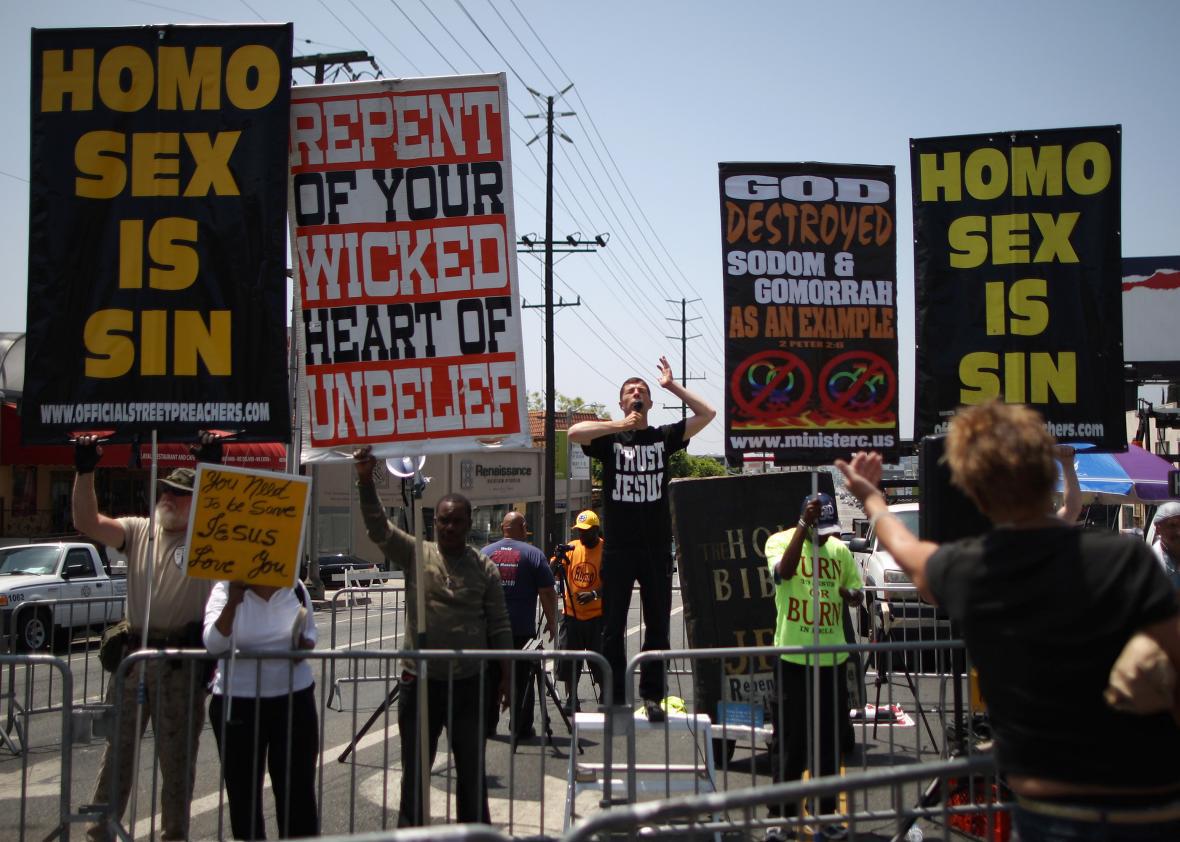When intelligent people repeatedly claim that a demonstrable falsehood is true, there are usually two possible explanations: They are either insane or lying.
The leaders of the American religious right are not insane. And yet they continue to peddle the bathroom predator myth as a real threat, despite overwhelming empirical evidence and professional consensus that it is entirely made up. That raises a fascinating and troubling question: If religious conservatives know the myth is just a myth, why do they keep spreading it? And, more important, what’s the true basis of their opposition to trans rights?
To solve this riddle, look no further than the Transgender Confusion and Transformational Christianity conference, put on by the Association of Certified Biblical Counselors in October 2015. Pitched as a serious examination of trans Christian life, the conference quickly descended into virulent attacks on the trans identity. Being trans, one speaker announced, is an “effect of the fall” of Adam and Eve, while “gender dysmorphia” [sic] is a “sinful instinct.” Men must be men and women must be women, the conference concluded. Any transgression, such as sex reassignment or gender nonconformity, must be condemned as contrary to Christianity, the Bible, Jesus Christ, and God.
We’ve heard this song before, of course: Explicitly religious opposition to homosexuality fueled America’s anti-gay hysteria through the 1990s. Congress even cited “Judeo-Christian morality” to justify passing a federal same-sex marriage ban. But the religious right switched tactics after the Supreme Court ruled out mere animus, including religious-based animosity, as a legitimate constitutional rationale for anti-gay laws. Instead, conservatives began to raise a “defense of marriage” argument, which insisted that genuine marriage is between a man and a woman. (They conveniently glossed over the fact that this definition is rooted in Christian theology.)
Anti-trans activists today are pulling a similar trick. Their hostility toward trans people remains fundamentally religious; the same Christian denominations that lined up against the validity of same-sex marriages have lined up against the validity of the trans identity. The Southern Baptist Convention has declared that “gender identity is determined by biological sex and not by one’s self-perception—a perception which is often influenced by fallen human nature in ways contrary to God’s design.” The Lutheran Church–Missouri Synod insists that the sex we are assigned at birth is “a God-given identity” and that gender confirmation surgery “will only mutilate the body God has given.” Pope Francis has suggested that gender transition “does not recognize the order of creation.” Most anti-trans religious reasoning falls along these lines: God created us male or female, and we must remain locked into one side of that binary from birth through death.
A few conservative commentators are commendably candid about the religious values that fuel their anti-trans views. Most, however, have adopted a strictly secular pretext, the bathroom predator myth. The myth is especially useful because it allows conservatives to pretend that they only object to trans bathroom use, rather than the trans identity itself. Nobody would listen to the right-wing media rail about God’s plan for sex differentiation, but they sure will listen to a bad-faith prevarication about bathroom molestation. Occasionally, the truth does tumble out; the National Review’s David French frequently references “natural law,” which is just a seemingly secular synonym for Catholic sexual ethics. But for the most part, conservatives have stuck to the bathroom predator script.
That leaves everybody in a bit of a bind. Conservatives can’t point to any actual instances of sexual predators pretending to be trans in order to access a women’s bathroom and commit sexual assault. (Tellingly, their attempts to do so only wind up accidentally indicting the sexist culture that promotes anti-trans laws in the first place.) Trans advocates can’t engage their opponents in an honest debate, because one side continues to cloak the real matter of dispute—can people assigned one sex at birth transition to another?—in pretext. And so we are stuck at this unproductive impasse, fixating on bathrooms, arguing about a threat that both sides know is nonexistent. The next time you hear an otherwise intelligent person repeat the bathroom predator myth, don’t just debunk it. Ask what their religion has to say about trans people.
